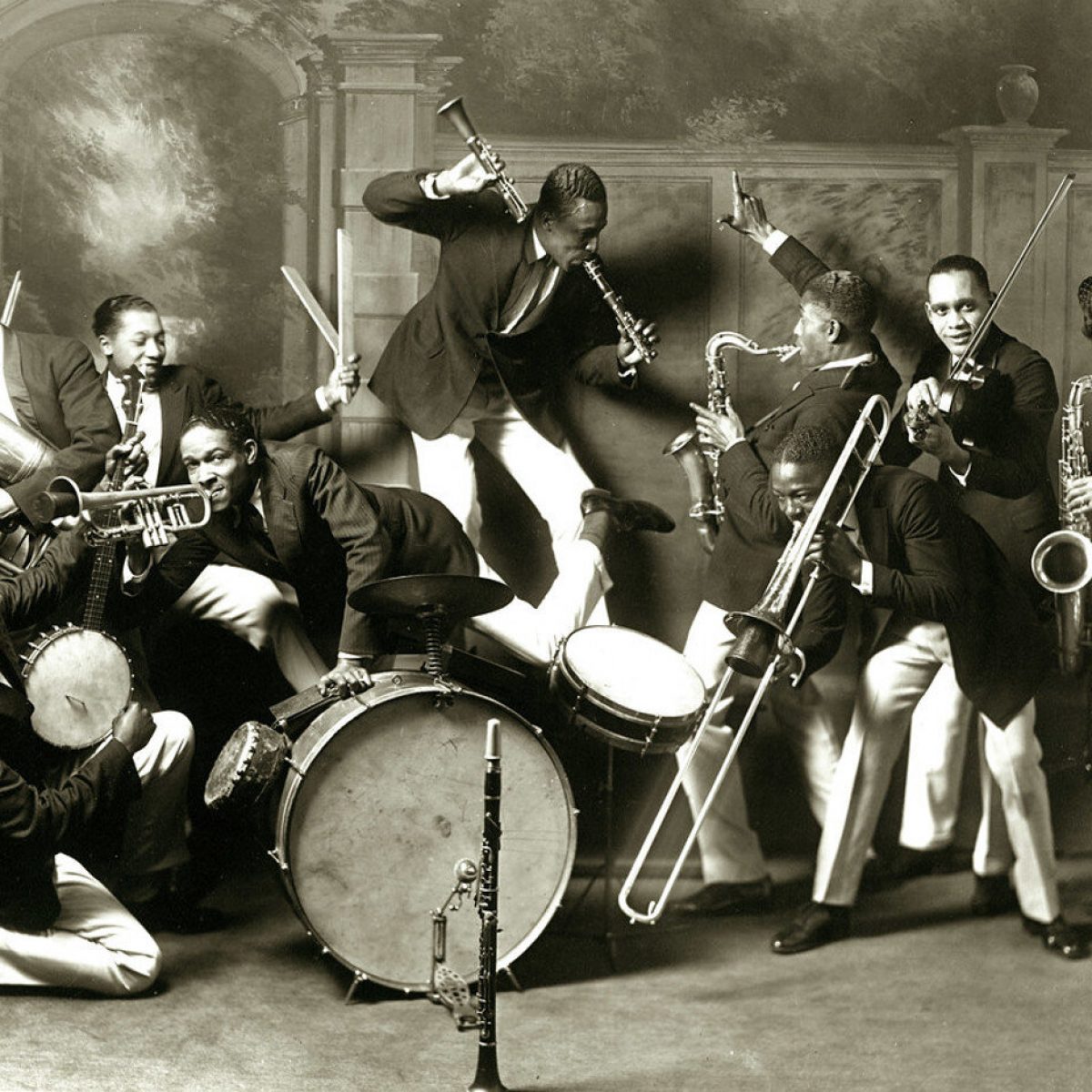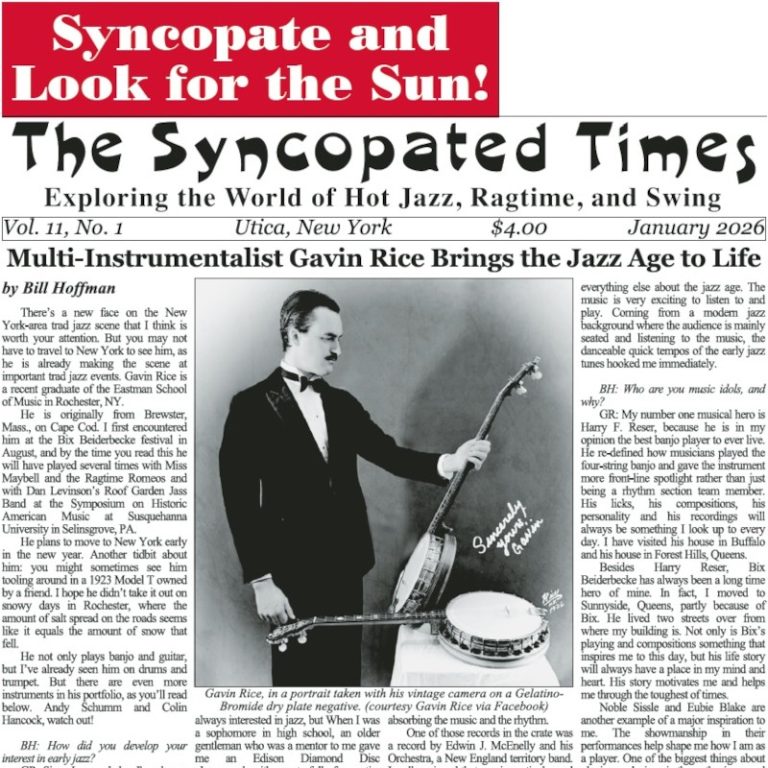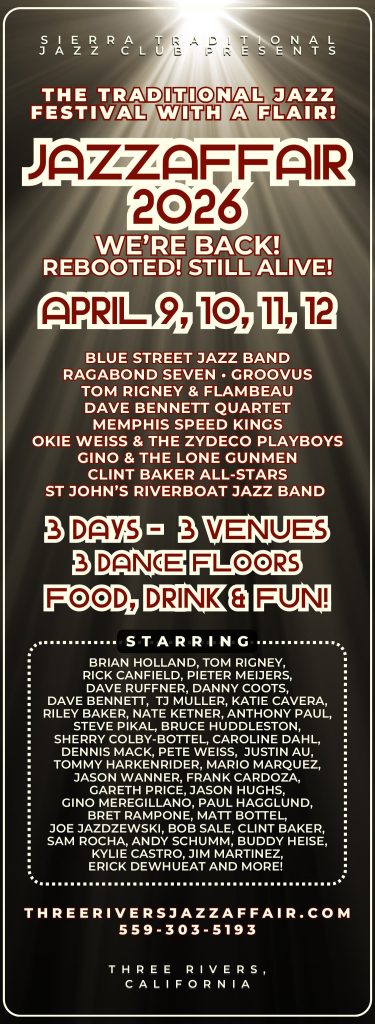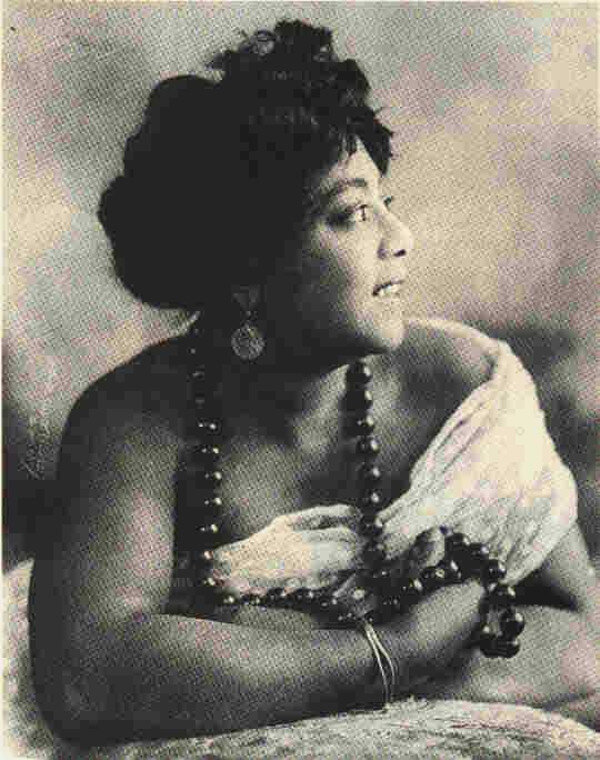 Mamie Smith was the first to record hit blues songs with her versions of Perry Bradford’s “Crazy Blues“, and “It’ s Right Here for You” on Okeh Records in 1920. The record was a wild success, selling over a million copies in less than a year, and finally ending up selling over two million copies.
Mamie Smith was the first to record hit blues songs with her versions of Perry Bradford’s “Crazy Blues“, and “It’ s Right Here for You” on Okeh Records in 1920. The record was a wild success, selling over a million copies in less than a year, and finally ending up selling over two million copies.
After this it dawned on record companies that there was a lot of money to be made selling what were then called “race records” to various minority groups in big cities. The success of “Crazy Blues” prompted other record companies to try to find female blues singers that could match the sales of “Crazy Blues”. It was a very important record, because it opened the doors of the recording industry to African-Americans, whether they were Blues, Jazz or popular singers and musicians.
Smith herself really wasn’t that much of a Blues singer, she was more of a vaudeville performer, although she included Blues and Jazz numbers as part of her act. She got her start as a dancer at age ten in the vaudeville act the Four Dancing Mitchells and later toured with them as part of the Salem Tutt Whitney and Homer Tutt’s show, “The Smart Set”.
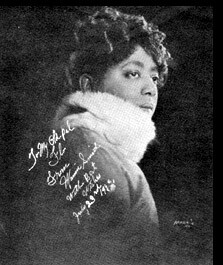 Mamie moved to New York in 1913 with “The Smart Set”, decided that she wanted to stay, and quit the show. She started performing as a singer in Harlem at venues such as Baron Wilkin’s Little Savoy Club, Leroy’s, Edmunds, Percy Brown’s and Banks’ Place.
Mamie moved to New York in 1913 with “The Smart Set”, decided that she wanted to stay, and quit the show. She started performing as a singer in Harlem at venues such as Baron Wilkin’s Little Savoy Club, Leroy’s, Edmunds, Percy Brown’s and Banks’ Place.
Her first recordings were made in early 1920. They were a couple of pop songs “That Thing Called Love” and “You Can’t Keep a Good Man Down“. They sold well enough and her manager Perry Bradford convinced Okeh Records that there was a market for earthier Blues records aimed at the large number of African-Americans who had migrated to the big cities of the north.
Bradford put together a band he called the Jazz Hounds for Smith that was led at first by cornetist Johnny Dunn and then by Bubber Miley. Smith put on quite a show that included trapeze acts, dancing, comedy, lavish costumes and jewelry as well as music.
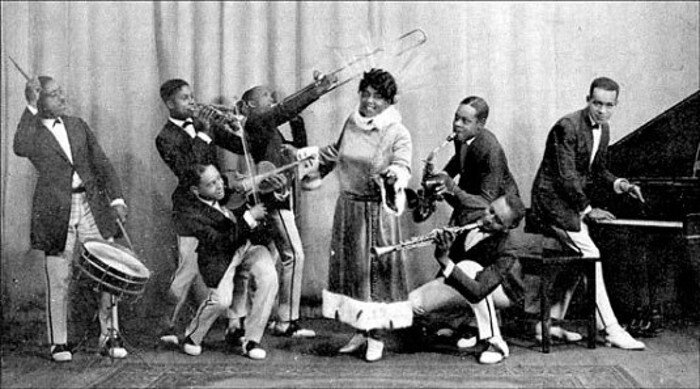
While on tour in 1921 she heard a young Coleman Hawkins playing saxophone in a theatre pit orchestra. Smith asked Hawkins to joined the band, but his family refused to allow him to, because he was just sixteen years old at the time. On her next swing through town in 1922 they onced again asked permission of the family and this time they acquiesced. Hawkins was soon given billing as “Saxophone Boy” and was a popular part of the act.
Smith continued to record for Okeh until 1923. In the 1930s and early 1940s Mamie Smith continued to lead a successful career singing and recording as well as appearing in several films. Mamie set the standard for female blues singers that followed in her foot steps. Nearly every other Classic Blues singer of the 1920s borrowed something from her act or styled themselves to achieve her success.
| Mamie Smith’s Jazz Hounds | Mamie Smith and her Jazz Band |
| Mamie Smith and Harlem Trio | Mamie Smith accompanied by The Choo Cho Jazzers |
| Title | Recording Date | Recording Location | Company |
| Do It, Mr. So-And-So (Myrtle Barger / Lukie Johnson) |
8-15-1923 | New York, New York | Okeh 40019 |
| Don’t You Advertise Your Man (Jimmy Foster) |
2-19-1931 | New York, New York | Okeh 8864 |
| Goin’ Crazy With The Blues (1) (Andy Razaf / J.C. Johnson) |
8-27-1926 | New York, New York | Victor 20210-A |
| Goin’ Crazy With The Blues (2) (Andy Razaf / J.C. Johnson) |
8-27-1926 | New York, New York | Victor 20210-A |
| Golfing Papa (Raymond) |
2-19-1931 | New York, New York | Okeh 8915 |
| Good Looking Papa Piano Accompaniment by Clarence Williams (Clarence Williams) |
7-23-1923 | New York, New York | Okeh 4935-A |
| I Once Was Yours, I’m Somebody Else’s Now | 8-31-1926 | New York, New York | Victor 20210-B |
| Jenny’s Ball (Reed) |
2-19-1931 | New York, New York | Okeh 8915 |
| Keep A Song In Your Soul (Fats Waller / Alex Hill) |
2-19-1931 | New York, New York | Okeh 8864 |
| Mistreatin’ Daddy Blues (Porter Grainger / Bob Ricketts) |
8-15-1923 | New York, New York | Okeh 4960-A |
| My Mammy’s Blues (Reb Spikes) |
8-16-1923 | New York, New York | Okeh 40019 |
| Plain Old Blues (Porter Grainger / Mamie Smith) |
8-6-1923 | New York, New York | Okeh 4960-B |
| Sweet Virginia Blues (Andy Razaf / J.C. Johnson) |
8-27-1926 | New York, New York | Victor 20233-B |
| That Thing Called Love (Perry Bradford) |
1-10-1920 | New York, New York | Okeh 4113-A |
| What Have You Done To Make Me Feel This Way? (1) (Andy Razaf / J.C. Johnson) |
8-31-1926 | New York, New York | Victor 20233-A |
| What Have You Done To Make Me Feel This Way? (3) (Andy Razaf / J.C. Johnson) |
8-31-1926 | New York, New York | Victor 20233-A |
| You Can’t Do What My Last Man Did (J.C. Johnson / Allie Moore) |
7-19-1923 | New York, New York | Okeh 4935-B |
| You Can’t Keep a Good Man Down (Perry Bradford) |
1-10-1920 | New York, New York | Okeh 4113-B |
| Artist | Instrument |
| Dope Andrews ? | Trombone |
| George Bell | Violin |
| Gavin Bushell | Clarinet |
| Harvey Brooks | Piano |
| Cecil Carpenter | Trombone |
| Buddy Christian | Banjo |
| Ed Cox ? | Trumpet |
| Johnny Dunn | Cornet |
| Ernest Elliot ? | Clarinet |
| Porter Grainger | Piano |
| Charlie Irvis | Trombone |
| Mike Jackson | Piano |
| Bubber Miley | Cornet |
| Tom Morris | Cornet |
| Leroy Parker ? | Violin |
| Cutie Perkins | Drums |
| Joe Smith | Trumpet |
| Willie “The Lion” Smith ? | Piano |
| Clarence Williams | Piano |
| Title | Director | Year |
| Jail House Blues | 1929 | |
| Paradise in Harlem | Joseph Seiden | 1939 |
| Sunday Sinners | Arthur Dreifuss | 1940 |
| Murder on Lenox Avenue | Arthur Dreifuss | 1941 |
| Because I Love You | 1942 |
Redhotjazz.com was a pioneering website during the "Information wants to be Free" era of the 1990s. In that spirit we are recovering the lost data from the now defunct site and sharing it with you.
Most of the music in the archive is in the form of MP3s hosted on Archive.org or the French servers of Jazz-on-line.com where this music is all in the public domain.
Files unavailable from those sources we host ourselves. They were made from original 78 RPM records in the hands of private collectors in the 1990s who contributed to the original redhotjazz.com. They were hosted as .ra files originally and we have converted them into the more modern MP3 format. They are of inferior quality to what is available commercially and are intended for reference purposes only. In some cases a Real Audio (.ra) file from Archive.org will download. Don't be scared! Those files will play in many music programs, but not Windows Media Player.


